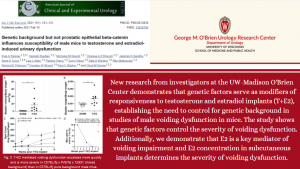
New research from investigators at the UW-Madison O’Brien Center demonstrates that genetic factors serve as modifiers of responsiveness to testosterone and estradiol implants (T+E2), establishing the need to control for genetic background in studies of male voiding dysfunction in mice. The study shows that genetic factors control the severity of voiding dysfunction. Additionally, it demonstrates that E2 is a key mediator of voiding impairment and E2 concentration in subcutaneous implants determines the severity of voiding dysfunction.